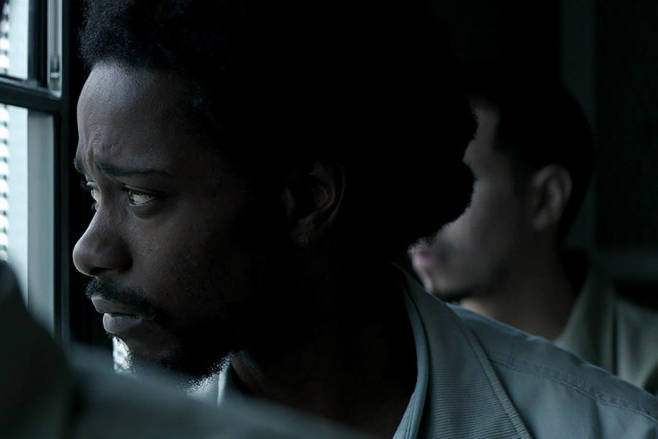Crown Heights won the Audience Award for Best Dramatic Feature at this year’s Sundance Film Festival. That’s a pretty good call, given that the movie shirks the kind of feel-good uplift that often marks such awards. Granted, it does have a redemption arc built into it—one many viewers will already know, especially if they heard the This American Life episode that recounted this true tale of a warped legal system—but for the most part this is a lean, terse telling of a nightmarish American story.
The facts involve a man named Colin Warner, played by the soulful Lakeith Stanfield. A Trinidad native in a West Indian community in Brooklyn, Warner was arrested in 1980 for murder. He was innocent, but an erroneous eyewitness identification—which the film suggests was the result of police bullying—led to his conviction and incarceration. Writer/director Matt Ruskin, whose second feature this is, assembles the film in brief scenes rendered in mostly docudrama style. For the film’s first half, Warner occupies our focus as he dazedly passes through the prison system and sees appeal after appeal fail to gain traction. The second half shifts the weight toward Warner’s friend and fellow Caribbean immigrant Carl “KC” King (former NFL player Nnamdi Asomugha), a blue-collar guy whose persistent efforts to free Warner are depicted in heartbreaking detail. After maxing out his credit cards to hire incompetent attorneys and losing his marriage because of his obsession with the case, King becomes a court process server just so he can meet attorneys who might be interested in hearing about the struggle.
There’s another main character, Antoinette (Natalie Paul), an acquaintance who grows closer to Colin after he goes to jail. But Crown Heights—admirably—doesn’t shift the focus to romance. Instead, the feeling between Colin and Antoinette is folded into the brisk storytelling flow. This is a movie about process, and it sticks to its clean, low-simmer momentum—when the end credits begin to roll, you’ll be amazed that this long, terrible story has taken only 90 minutes to recount. If Ruskin’s work is visually somewhat conventional, his skill as an editor snaps the movie into consistent focus.
The film occasionally breaks that flow by reaching for a larger perspective, including video clips of presidents from Reagan to Clinton flouting their tough-on-crime credentials. The implication is that building an enormous prison complex over the past few decades has jailed innocent people like Colin Warner, swept up in the profitable frenzy to fill cells. Ruskin might be hammering his point a little hard by including these moments, even if their bird’s-eye view provides a contrast to the granular approach of the rest of the movie. Much more effective is a scene in which King visits his friend in prison, and Warner asks him why he’s working so hard on the case. King says it’s because he knows it could be him behind bars instead of Warner; he doesn’t say, “Because I’m a black man in Brooklyn,” but he doesn’t need to.
The actors are keyed into Ruskin’s low-simmer approach; nobody goes big or showy here, and Asomugha and Bill Camp (as a low-level lawyer who becomes intrigued by the case) are the epitome of lunchpail performers who put their heads down and get the job done—just like their characters. Stanfield was in Selma and Straight Outta Compton, and he proved his galvanizing presence in his brief but unforgettable turn in Get Out. Here he acts out Warner’s Kafkaesque frustration mostly with his eyes, which perceptibly lose their light as his sentence drags on.
Unlike Kafka, Crown Heights doesn’t have a feel for the cosmic absurdity of this situation; it sticks to the level of a strong Law & Order episode, its outrage contained to small bites of plot and stray detonations of utter sadness. That sort of journalistic style wears well for this material, especially given its factual basis—this is a calm, methodical response to a life-altering corruption of justice. Crown Heights, Rated R. Opens Fri., Sept. 8 at Seattle 10, Alderwood, Southcenter.
film@seattleweekly.com






